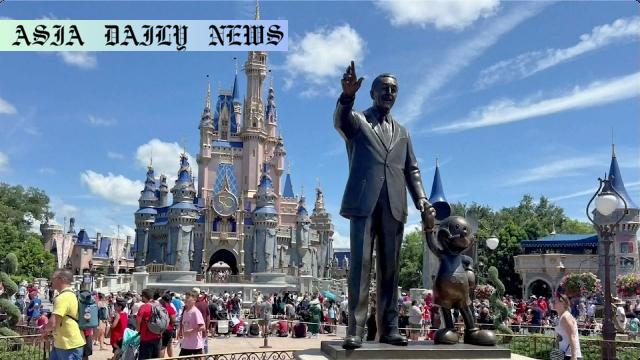Diversity initiatives are evolving at Disney as the company shifts focus towards executive compensation and a ‘Talent Strategy’ factor.

Introduction
The Walt Disney Company, a pioneer in the entertainment industry and champion of diversity and inclusion, is reportedly revisiting its initiatives regarding Diversity, Equity, and Inclusion (DEI). The company has decided to evolve its approach, shifting focus on executive compensation planning and the introduction of a new ‘Talent Strategy’ factor. This move aligns with a broader corporate trend of reassessing DEI in response to political critiques and evolving business priorities.
What Prompted Disney’s Review of DEI?
DEI policies became a significant focal point during former U.S. President Joe Biden’s administration, which encouraged companies to enhance workplace inclusivity by setting measurable diversity targets. However, Disney’s decision to revise its DEI strategy comes at a time when several companies, including Amazon and Walmart, are stepping back from activism-driven diversity programs. The influence of President Donald Trump’s administration and its contrasting outlook on DEI initiatives have played a pivotal role in reshaping the priorities of corporate giants.
The New ‘Talent Strategy’ Factor
Rather than abandoning the concepts of diversity and inclusion outright, Disney has opted for a strategic pivot. At the heart of the company’s revised plan lies the ‘Talent Strategy’ factor. This metric will serve not only as a way to quantify leadership’s commitment to Disney’s values but also to foster diverse perspectives in organizational decision-making. The company describes this as an ‘evolution’ of its original DEI goals, signaling its enduring priority to create a supportive and inclusive environment, albeit through a refined lens.
Conservative Backlash Against DEI
Diversity, Equity, and Inclusion frameworks have been criticized by several groups, notably conservatives in the United States. Many critics argue that DEI initiatives focus too heavily on quotas and may overshadow merit-based hiring and advancement. Companies like Disney now find themselves at a crossroads: balancing the importance of promoting inclusivity and addressing political resistance that questions the effectiveness and fairness of aggressive diversity targets.
Industry Trends: Disney is Not Alone
Disney’s move aligns it with other large corporations such as Amazon and Walmart, which are also rethinking their commitments to DEI frameworks. This trend suggests a broader effort to streamline diversity initiatives without alienating stakeholders or diluting organizational goals. As corporations shift their focus to measurable, performance-based talent strategies, these changes may redefine workplace inclusivity and the way it contributes to business success.
Impact on Employees and Stakeholders
The evolution of DEI practices is expected to have mixed implications for employees and stakeholders. For employees, the emphasis on leadership accountability could promote a more inclusive culture without disproportionately prioritizing specific demographics. However, stakeholders who supported the original strong DEI stance may view these changes as a step back from progress. Disney will need to navigate these shifts with transparency to maintain goodwill among its diverse clientele and workforce.
Conclusion
Disney’s revision of its diversity policies highlights a significant moment in corporate America. By replacing traditional DEI initiatives with the ‘Talent Strategy’ framework, the company frames a new narrative centered on leadership values and successful business outcomes. While the changes may be met with skepticism from some quarters, they also allow Disney to retain a commitment to inclusion while adapting to shifting societal and political landscapes. Time will tell if this approach becomes the benchmark for other industries navigating similar challenges.
Commentary
Navigating a Shifting DEI Landscape
Disney’s decision to reevaluate its Diversity, Equity, and Inclusion (DEI) policies reflects a broader turning point in corporate America. Many companies are grappling with balancing business imperatives, political pressures, and the genuine need for workplace inclusivity. For Disney, a brand that has long been recognized for its progressive stance, this shift is particularly noteworthy. It raises questions about how businesses can champion diversity while addressing criticisms about over-reliance on quotas or other rigid frameworks.
A Pragmatic Approach to Inclusion
The introduction of a ‘Talent Strategy’ might seem like a step back to some, but in many ways, it reflects a pragmatic evolution. By focusing on leadership accountability and incorporating diverse perspectives into core business strategies, Disney is ensuring that inclusivity remains a vital part of its corporate ethos. This approach might allow for greater flexibility and sustainability, avoiding the pitfalls of diversity targets that may feel artificial or prescriptive.
The Broader Implications
It is important to reflect on how these shifts might shape the future of workplace culture. As one of the most influential companies in the world, Disney’s strategies often set benchmarks for the industry. If this approach succeeds in aligning diversity with business success, it could usher in a new era of corporate accountability. However, there’s a risk that such changes might dilute the urgency and momentum built around DEI over the years. Striking the right balance will be key.
Conclusion
Ultimately, Disney’s recalibration of its diversity efforts signals an attempt to evolve with the times, bridging past ideals with future realities. While the effectiveness of this move will only become apparent in the years to come, one thing is clear: the conversation around diversity and inclusion in corporate spaces is far from over. Disney has opened another chapter in this ongoing narrative, inviting reflection and innovation across industries.


